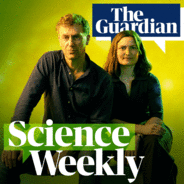As the sleep tracking industry booms, some worry that it could be driving orthosomnia, the medical term for an unhealthy obsession with attaining perfect sleep, usually driven by a wearable device. Madeleine Finlay speaks to consultant neurologist and sleep physician Dr Guy Leschziner to find out whether this tech is helping or hindering our chances of maximising sleep’s health benefits. Help support our independent journalism at theguardian.com/sciencepod

Wissenschaft & Technik
Science Weekly Folgen
Twice a week, the Guardian brings you the latest science and environment news
Folgen von Science Weekly
300 Folgen
-
Folge vom 17.10.2024Is sleep perfectionism making us more exhausted?
-
Folge vom 15.10.2024What Milton and Helene reveal about the future of hurricanesIan Sample speaks to Bernadette Woods Placky, chief meteorologist at nonprofit Climate Central, about the 2024 Atlantic hurricane season so far, and what it tells us about how hurricanes will behave in future. Help support our independent journalism at theguardian.com/sciencepod
-
Folge vom 09.10.2024All the news and science from the 2024 Nobel prizesWith awards for the discovery of microRNA and the creation of new proteins, plus recognition for artificial intelligence via the physics and chemistry prizes, Madeleine Finlay hears from the Guardian science team – Nicola Davis, Ian Sample and Hannah Devlin – as they break down the news, science and surprises from this year’s Nobels. Help support our independent journalism at theguardian.com/sciencepod
-
Folge vom 08.10.2024Could AI help fight conspiracy theories?We’re used to hearing about the power of artificial intelligence to spread misinformation – but could it also be a tool for persuading people of the truth? Ian Sample speaks to Thomas Costello, an assistant professor of psychology at American University, who has published a study exploring the potential for AI chatbots to lead people away from conspiracy beliefs. Help support our independent journalism at theguardian.com/sciencepod
